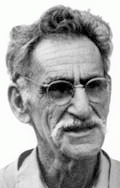In February New Directions will publish New Collected Poems by George Oppen. Born almost a century ago, Oppen fought and was injured in World War II, published his first book when he was in his mid-twenties, then stopped writing and joined the Communist Party. Twenty-five years later he resumed writing and won the Pulitzer Prize in 1969 for his book Of Being Numerous. He died in 1984.

The collection will replace the earlier, smaller Collected Poems, also published by New Directions, in 1975. Edited by Michael Davidson, the new book collects all of Oppen's published work, as well as a selection of his previously unpublished poems.
In his introduction to the volume, which includes a preface by Eliot Weinberger, Davidson writes that Oppen was "not someone who approved of casual miscellany," and might have been dismayed to see some of the new material in the book-the poems "taken from manuscripts and working papers that he never intended to print at all."
Poets & Writers Magazine asked Davidson why he thought it important to include a section of Oppen's unpublished poems.
Michael Davidson: In making that qualification I was trying to acknowledge Oppen's rigorous standards for poetry and to indicate that he might not have agreed with my choices of unpublished materials to include in a posthumous edition. At the same time, those same rigorous standards produced many poems that I feel are quite legitimate by Oppen's standards but which, for various reasons, were never collected. Remember that he began to have problems with memory by mid-1970, and his final volume, Primitive, was not included in his Collected. Nor were many other poems published in magazines during the 1970s and 1980s. One might argue that since Marianne Moore pruned her poems back to a thin volume toward the end of her life, we should respect her editorial decision-but we would be denied the pleasures of almost two-thirds of her work. So an editor has to make a judgment call about returning those poems to circulation, and my own feeling is that, given George's small output, we need to see as much as is possible.
As I say in my introduction, I have added two kinds of poems: those that Oppen published in magazines but never collected and poems in manuscript upon which he worked for some time. I also included poems that seem to be variations on (or germs for) poems already in the 1975 Collected. This way, the student of Oppen's work has a bit more to work with. But as I said above, it's a difficult editorial decision to make when you are dealing with a poet who had such high standards for the integrity of the poem.
P&W: Do you think Oppen has received the kind of recognition he deserves, compared to the generation of poets who preceded him—Pound and Williams—and those who came after—Creeley, Duncan, and Olson?
MD: I don't think that Oppen has received adequate recognition from the major literary establishment, nor has he been as thoroughly discussed, critically, as have many younger (and lesser) poets. But he does command enormous respect among poets in a variety of different areas. Of the Objectivists, he is the poet who seems to cross-over into multiple camps, earning the praise of Sharon Olds, Shirley Kaufman, Robert Hass, and Robert Pinsky, as well as Charles Bernstein, Rachel Blau DuPlessis, and Susan Howe. I note, however, a tendency among some poets and critics to make Oppen into a considerably more user-friendly poet. At a conference on the Objectivists in Royaumont, France, some years ago, a spirited debate was launched over Charles Bernstein's remark that Oppen was a "difficult poet" whereupon Carl Rakosi piped up, challenging Charles's claim. The French in the audience largely saw Oppen as "difficult" in the way that Zukofsky is, but many Americans in the audience, spurred-on by Carl's remark, defended the "plain style" Oppen. In subsequent reports on this conference in Poetry Flash, respondents lined-up on different sides of the fence, alternately claiming Oppen as a predecessor of language-writing or as a populist poet like Sandburg. The fact that Oppen has generated such widespread debate suggests that he can be read from a number of different optics.
P&W: What do you think a poet like Oppen offers a new generation of poets?
MD: I think that in an era in which language is increasingly processed through predictable formulae, when the creative writing poem can now accommodate almost any experience or idiom, Oppen's resolute refusal to subordinate his poetry to any instrumental purpose or closure is very attractive. And I also think that his decision to forego poetry for political action was a brave act in an age that demanded an art in service to revolutionary goals. In this sense he joins with writers such as Paul Celan, Samuel Beckett, or Edmund Jabes (John Taggart notwithstanding) who make writing the place where silence can be "heard," where the pain of the Holocausts of Auschwitz and Hiroshima can be reenacted, where language is, finally, revealed as inadequate to what we experience as the truth.
In the light of September 11, where modernist technology was used to attack modernism, the idea of the "new, the really new," as a value in itself seems somehow a vain endeavor. Oppen told "all the truth but told it slant" and offered an ethical poetry for an unethical time.








